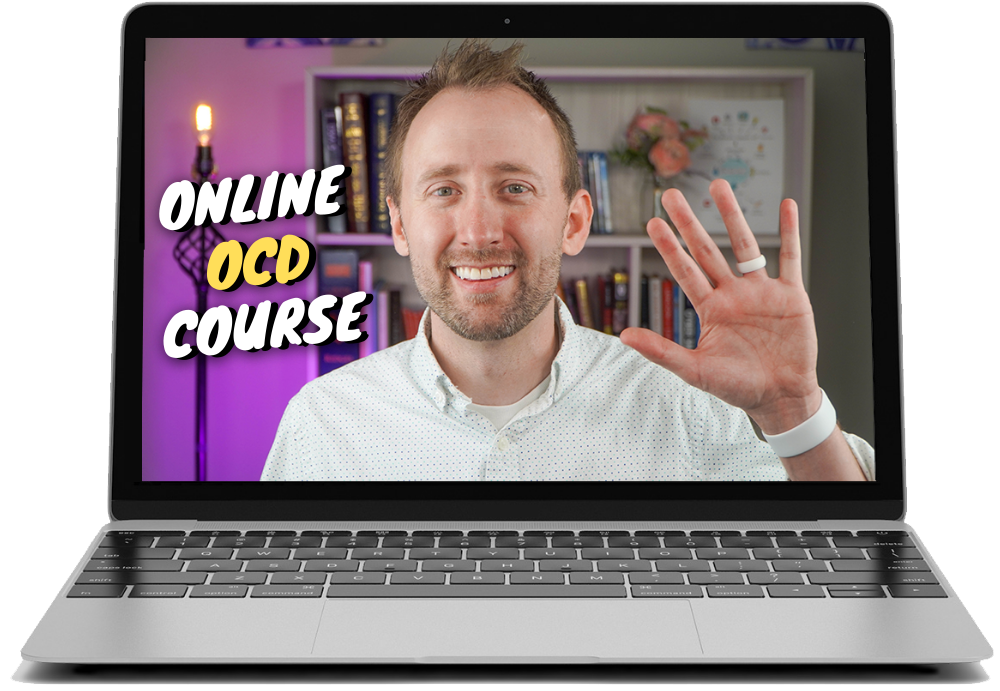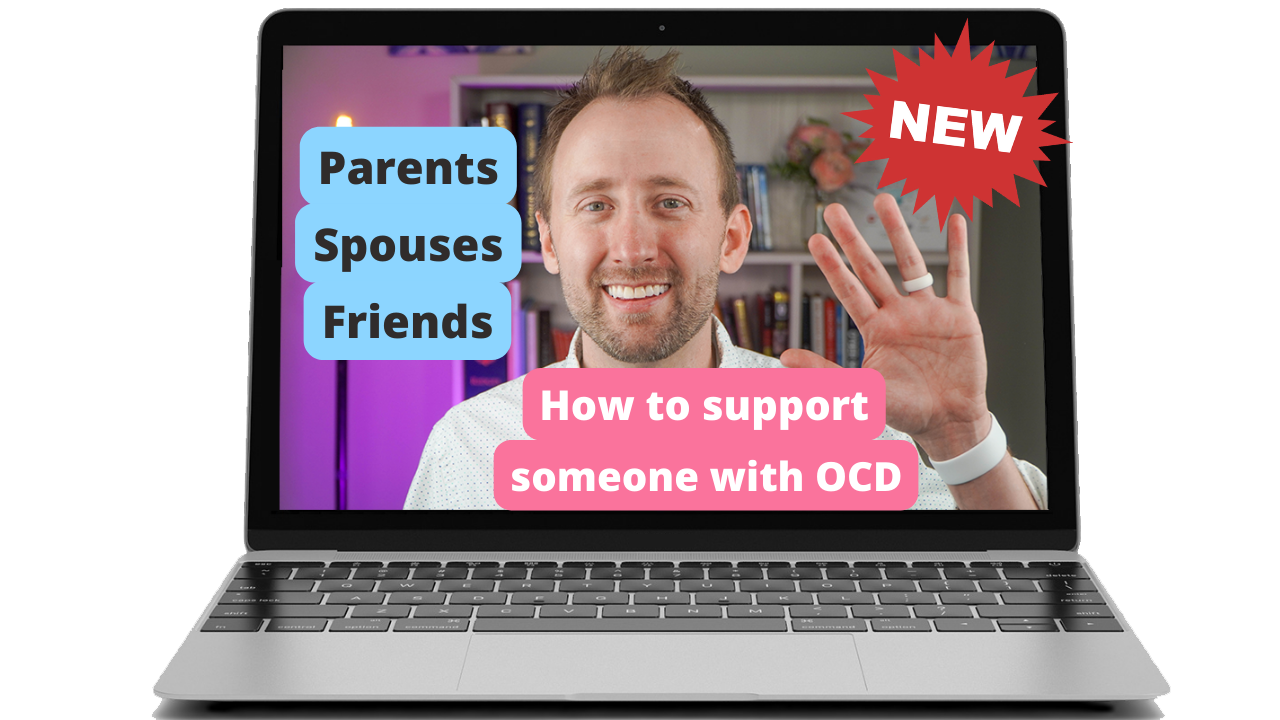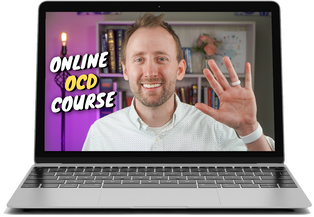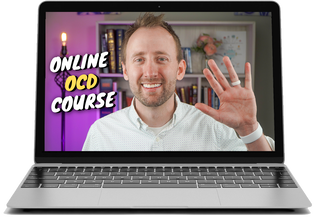How to stop being perfectThis is Nathan Peterson, licensed clinician and OCD specialist. Did you know that not all protectionism is bad? I'm going to get right into what healthy perfectionism an unhealthy perfectionism look like. Healthy is goal oriented behavior. Great organizational skills. Persistence and a high standard for yourself. Unhealthy perfectionism May consist doubts whether you're doing something correctly or not. Creating unrealistic expectations for yourself. Maybe having a preoccupation with past mistakes. A high level I thought when it comes to making decisions and the fear that you might make a new mistake. Correcting or fixing something over and over and over again until it's just right. Let's go over what perfectionism OCD looks like and what we're going to do with this pesky need to be perfect. This is one of the key phrases to remember. Just right. Individuals may feel this intense emotion (often anxiety) if something is wrong, even if it's not. They may spend hours trying to correct something or do a behavior until this feeling feels okay or until it's just right. This could be reading something over and over and over again because the brain says all right and if you don't do it again you probably won't get a hundred percent on that assignment. The trick is it doesn't seem to be a point or the brain says, that's it! You are perfect and you got it. Do your best. That is something we've been taught our entire life. Our whole society is based off of succeeding and competing with each other. What is this advice actually starts controlling your life. You don't feel like anything is good enough. You even gotten 100% on an assignment but you know there's an extra credit point I could have given you a 101% --- a lot of this has to do with self-worth and really anxiety. When your self-worth is defined by your achievements yet you are not happy with any of them thus creating the need to correct and perfect all over again. Somebody has an unrealistic a goal of themself that really is unattainable, they try endlessly to to succeed and they will continue to ruminate on this goal that is simply not ever going to be met. and when this goal is not met, it only drives them to continue working on it in feeling anxious and worthless by the same time. Some may say, who cares if somebody has a high goal of themself. Well, the difference between someone setting goals vs. Perfectionism is that with perfectionism they're feeling a lot of anxiety, they're doing a lot of repetitive behaviors that are often unnecessary and doesn't take them closer to a goal. In short, perfectionist make no room for mistakes. They may be preoccupied with past mistakes in fear future failures. They may see others around them and have a high expectation and standard for them as well. In short, we're going to mess this it all up. We are going to use what is called exposure and response prevention. actually we'll practice making mistakes on purpose. We will do something wrong. We're not going to do anything that breaks your morals or values. Instead we are going to find the thing it matters to you the most and mess it up. Maybe I send a text message to my friend with a lot of misspelling. I might actually not read a page in my textbook. I'm going to do the things that make me feel nervous and anxious and respond completely different to them. I'm going to risk that people might judge me. My response is important. If I send a text with a lot of misspelling I don't sit there and say, I hope they're not judging me. instead, I might be saying I sure hope they judge me today. Man I love making mistakes. They may or may not be judging me. I'm possibly never getting into that College. I sure hope I miss a question on my assignment. Because I feel the need to re-read this phrase I'm actually going to read it backwards. I'm going to purposely not know this thing right now. What happens is that my brain learns actually I'm okay. That when there is an actual problem we will solve it. If someone judges me someday, I say, bummer. That's too bad. eventually we are living a life we want to live. We can have those moments of satisfaction but know that it doesn't mean everything. We grow with this feeling of not being satisfied and not feeling like we did well enough. We don't always have to take action just because we had that feeling. So with the treatment name, exposure and response prevention, you are exposing the fear that you were making a mistake can you are responding as if you simply don't care. You're choosing to feel anxiety on purpose. These feelings can't last forever which is why we keep practicing it over and over and over again. What mistakes are you going to make today? How can you be imperfect? can you know what's related a lot this perfectionism, this feeling of being just right which is talked about in this video right here on the screen. Go to it right now if you experience this as well. Perfectionism OCD
0 Comments
What is checking OCD and how to stopThis is Nathan Peterson, licensed clinician and OCD specialist. Is the door locked? Is the stove off? Did I shut off the water? Did I turn off the lights? Did I send an inappropriate email? Did I forget something important? Did I unplug the toaster? How about I check one more time....just in case? Checking OCD or rather these compulsions are tough because was is the harm checking one more time? I mean, it doesn't take very long to do and you ensure that you've kept yourself safe or others. At least that's what your brain wants you to think. We will be going through what checking OCD looks like what we're gonna do about it. Ultimately individuals who have this type of OCD will often think that somehow they will cause harm or something bad to happen to either themselves or others. Intentionally or not. What wins every single time is that it's not worth the risk to not go check. Individuals often think if they don't go back and check, they will have this thought on their brain all day. This checking can fit in many areas of someone's life. They can be driving a car go back and check if they hit somebody because they went over a bump. Back multiple times, just to make sure. They may be checking the news to see if there any reports of somebody getting hit. Someone may check their browser history to make sure they didn't look at anything inappropriately. They could check body symptoms for any health concerns. Check for moles, lumps, heart, and really anything that indicates a problem. They could check for any mistakes they've made in their life. Replaying moments in their mind to check if that's really how it went down. Here is why we know this repetitive behavior is OCD. Because often times an individual gets stuck checking time and time and time again. Somebody can touch the burner verify to them that it is off. And just as they turn their back, the brain says, but are you sure? It's this need for certainty and relief of anxiety and this urge. Because who wants to risk a fire? Risk their health? Risk hurting someone? Individuals often think that they couldn't live with themselves if it was their fault. You've got to know that these individuals care. And that is why this OCD is attached to this so much. They care so greatly and is one of their big values in life. It is worth it for them to spend minutes, hours, days checking and rechecking just to make sure you are safe. So this is what works for this type of OCD. We are going to be using exposure and response prevention. This means that you are exposing yourself to the uncertainty of whatever it is you want to check. When you were sitting in bed and your brain tells you to stand back up and go check the door one more time, we are choosing not to. We're not just gonna twiddle our thumbs and panic. Instead we are going to respond completely different. Some responses are, the door may not be unlocked. Sure I guess the door will stay unlocked tonight. Yep someone might breaking to my house. Cool would it be wonderful if someone broke in tonight. I am willing to risk that the door is unlocked tonight. The only way I'll know is when I wake up tomorrow. I am using statements as if I do not care. I am tolerating some uncertainty. Also I'm willing to risk whatever it is. And people always say, but what if this is the time I didn't check and something happened. That is the risk. Risk that you actually did not lock the door and find that majority of the time it doesn't matter anyway. The difference between normal checking and obsessional checking is the urge and anxiety to do so. The urge is so absolutely strong mixed with this anxiety, we might risk it this time. A lot of people think they are different, OK I could risk the door, but I can't risk but the stove stays on. I can't risk that I didn't actually hit someone with my car. I can't risk that hurt somebody's feelings. I can't risk that I might've done something inappropriately. Don't get cut up into thinking that your obsession is different than someone else's and more valuable. OCD is OCD. What ends up happening is that somebody's willing to risk these things they wanna check and respond completely different to them that their brain will learn over time that they are actually OK. They don't have to convince themselves, they've learned through experience. And you know what, if there is a problem we will solve it. We do make mistakes and we need to learn to handle those. This past year I left the gas burner on all night after cooking dinner. I woke up in the morning and saw the flame a rumbling and I guess what I did. I turned it off. There was a problem and I fixed it. We can spend hours preventing a problem that may never ever be a problem or risk and only fix problems when they're actual problems. Did you know that we didn't react based on how you feel in our mood? Do you understand OCD mood swings to help you more with this checking, make sure you check out....get it..."check out" my video on OCD mood swings what you're going to about them. Stop checking body symptomsDisgust Contamination OCDThis is Nathan Peterson, licensed clinician and OCD specialist.
Did you know that the fear of contamination or being germy doesn't always lead to the fear I'm getting sick? What about having certain thoughts and now I am mentally contaminated. My brain is unclean. This feeling is wrong. In fact many feel this overwhelming feeling of general disgust. In this video we will be going over what mental contamination OCD looks like and explain this feeling of disgust, also we're going to go over how you're going to handle this feeling and thoughts. Imagine this for yourself. You touch door handles, shake people's hands, touch that shopping cart and make it home. Most of the time we just wash our hands and move on. With mental contamination, these individuals may do a physical action to try to fix something that's happening mentally. Washing my hands means I'm washing a feeling. I'm washing a thought. I'm going to continue doing this physical action until I feel better. It actually doesn't have to be washing either. It could be tapping something a certain amount of times, avoid certain items, words, or images. When we think of contamination we think of I'm going to get some germs on my hand and get sick. These individuals are experiencing is, I'm going to get germs on my hand and I'm going to feel disgust, gross, and this feeling is not going to go away until I can fix it. Or this, I had an intrusive thought that doesn't match my value system and I felt disgust, this feeling will not go away until I do something to fix it. I may have to repeat a certain word in my head over and over and over again as to cleanse this feeling. I may have to physically wash something. Maybe it's do some type of ritual until I feel better. Here's what we're going to do about this mental contamination. Mess it up. That's right. We are going to purposely touch the contaminants. Purposely engage with the things they make us feel emotionally contaminated. You get to set the rules. Our goal isn't to figure out how you cannot feel this disgust feeling. instead it's to live life with this feeling as long as you're doing exactly what you want to do. But this feeling can't last forever. You can even respond differently to the disgust feeling. Celebrate it. Have a party! When you feel disgust imagine blowing a kazoo. Yahoooo! Love this feeling. I hope it lasts all day. As long as I'm not responding to it with any value it's teaching the brain that you're not falling for it anymore. To me, it's a false signal, trying to get you to react, so why not poke the bear and do the opposite. Touching that door handle made me feel internally contaminated, I'm going to go touch it again. I'm going to watch that video clip again. I'm going to mess up the compulsion so bad that my brain doesn't even come up with this idea. Yes the anxiety and distress will be there. But it can't last forever. You've go to stop these compulsions and that's why I created this video to help you do so. It's a simple trick that works for most. You'll need to know it to power yourself up. Click on it here. Thanks so much for watching and I'll see you next time. Counting Compulsions OCDCounting as a compulsion is very common in the OCD world. Often individuals may count to gain a feeling of "just right" or "yep now I can stop" - That's the feeling I was looking for. Often this counting is done is avoid anxiety and the fear of the feeling that something is "wrong". We're going to talk about why counting happens and what you're going to do about it. You may be wondering, what do you mean by counting Nate. Well, let me tell you. Counting can be literal counting. It can be tapping something while counting. It can be doing an action over and over again while counting. Some may count to a certain number until it feels right or until their brain says, "Whooo, you prevented that bad thing from happening." They may count in odd numbers, even numbers, they can count in 4's -- it literally is whatever their brain said is the way they should do it. Here is an example. My spouse calls me and say, "Hey, I'm headed home from work. Be there in 20 minutes." At that moment, I turn off my phone and my brain says...."well crap...I just turned my phone off the wrong way, if I don't redue it 8 times, my spouse is in real risk of crashing and it'll be my fault." So I grab my phone and turn it off and on 8 times. Well crap...that actually didn't feel right, I better do it again. Maybe I need to put in the password and THEN turn off the phone 8 times. Okay okay...that was it. Now I feel like I've reduced this risk and my anxiety went away. When I see my spouse walk in the house it verifies to me that the only reason she is safe is because I took action. OCD tricked me into believing something that actually is untrue. I see this counting done so randomly, unplanned and out of the blue. The brain says 37 times I need to push the J button on my keyboard...sometimes there is no known risk or responsibility. I just know it HAS to be done or I won't stop thinking about it AND I'm going to feel anxious or distressed until I do it. Sometimes when someone is counting is actually is pretty automatic. It's just something they do and have done for a while. For instance, someone may count floor or ceiling tiles, words in a sentence, the amount of steps they are taking, how many times they dribbled the basketball, how many passes they made, really anything you can think of, they may count it. There is no rime or reason to it other than not wanting to feel uncomfortable or feel responsible. Someone can get triggered because they saw a certain number or color that makes them go through their counting routine. You know what we're going to do about all this counting? Completely mess it up..and I'll show you how. To treat counting OCD compulsions, we use exposure and response prevention. Essentially what we want to do is break OCD's rules. You will be exposing yourself to the discomfort and anxiety and RISK the the responsibility threat that comes your way. So using my example of my spouse, Instead of me turning on and off my phone. I'm actually going to either leave it and not engage with the phone anymore or I'm going to make it very unsatisfying by maying turning it on and off 3 times instead of my normal 8. The brain is likely to freak out and say, "WAIT! WHAT ARE YOU DOING?" It's going to be your fault, they will crash because of you AND your anxiety will never go away. So the response part is this......yeah man, I messed it up and they may or may not crash or I just agree with it and say, "totally, crashing here we come." The response part is crucial. I'm essentially acting like I don't care and am willing to do this until my distress reduces. What will happen is that my spouse is likely to walk in and then you just caught your OCD red handed. That little liar. "Uhhh okay, well I know I told you that you were in danger, but I was wrong.....NEXT time though." Once the brain learns that you actually weren't in danger and that you could tolerate not counting those urges to count start slowing down. Wow what a trip! Have you had these counting compulsions before? To enhance your OCD knowledge and recovery journey, make sure you go watch my video on sneaky compulsions because these are done a lot! How to stop counting |
AuthorNathan Peterson specializes in working with OCD and Anxiety related disorders and has done so for the past 7+ years. Archives
January 2023
Categories
All
|





 RSS Feed
RSS Feed